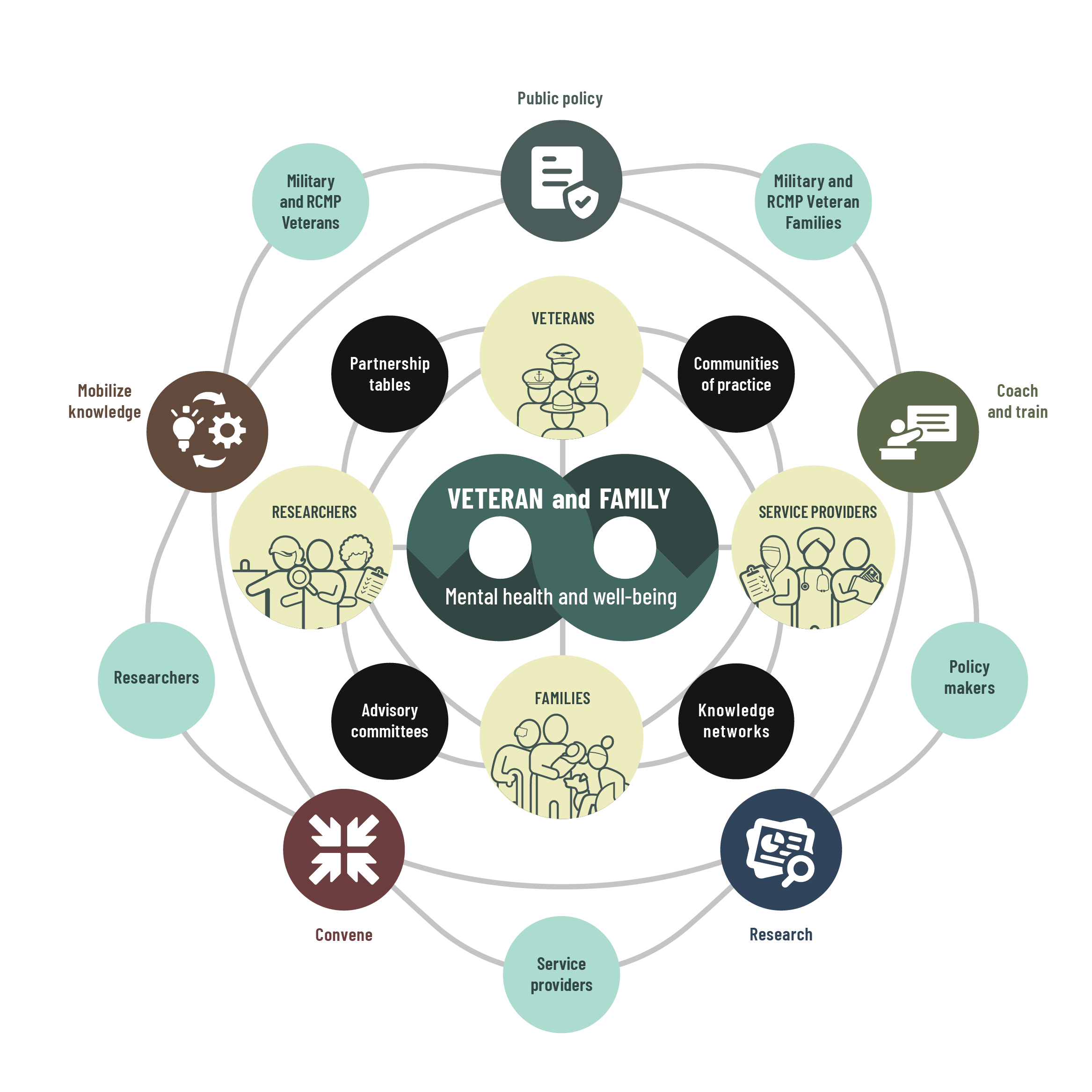Network
Atlas is one part of a much larger picture. Our mandate is to increase knowledge creation, knowledge sharing, and collaboration, and as such we are part of a wide-ranging, extended community – what we call our Network. We aim to maintain and grow our existing network groups and we encourage new relationships to form in response to system needs.
As an independent intermediary team, we proudly serve Canadian Veterans and their Families alongside other national organizations. Atlas also works with international organizations in a global effort to enhance the mental health of those who have served as well as their Families.
For more information about who we are and what we do, click on the video linked below.
Purpose
We develop and maintain partnerships to advance research that is meaningful to Veterans and their Families. These partnerships create and mobilize practical resources across the country. No Veteran or Family member should be without supports, no matter where they are in Canada. By working with other groups across the country, we can reduce duplication and enhance alignment across the broader mental health and well-being system.
Lived experience team
Our work focuses amplifying the voices of Veterans and Families with lived experience, and those who study and support them. We have a team, who brings their personal experiences as a Veteran or Veteran Family member to Atlas Institute.
Strategic Reference Group
The Strategic Reference Group, consisting of around 15 volunteer members including Veterans, Veteran Families, service providers and researchers, provides the Atlas Institute with strategic advice to advance the Atlas Institute’s vision, mission and strategic goals. Members provide their independent and objective expertise on specific initiatives and priority areas, while serving as ambassadors on behalf of the Atlas Institute.
Chair: Fardous Hosseiny, President and CEO, Atlas Institute for Veterans and Families
Members:
- Dani Alarie, Social Worker, Nova Scotia Operational Stress Injury Clinic
- David Paul, Ph.D., R. Psych.
- Deborah Norris, BHEc, MSc, PhD, Mount Saint Vincent University
- J Don Richardson, MD, FRCPC, St. Joseph’s OSI Clinic/MacDonald Franklin OSI Research Centre
- Jennifer Bourassa, Captain (Ret’d), RSW, MSW, British Columbia Operational Stress Injury Clinic
- Justin Woodcock, BSW, Sailor 2nd Class (Ret’d)
- Stephen Morrison, CD, Petty Officer, 1st Class (Ret’d)
- Sydney Smee, PhD
- Tanis Giczi
- Tarik Kadri, Captain (Ret’d), RSW, MSW in private practice
- Tristan Janosik
- Walter Callaghan, PhD candidate, Department of Anthropology, University of Toronto
Note: The names listed include only the individuals who have provided explicit consent to be included on the Atlas website. The list is not comprehensive or inclusive of all current or past reference group members.
The Strategic Reference Group operates under the authority of the Atlas Institute’s executive leadership team and has an advisory function only.
The purpose of the Strategic Reference Group is to:
- Offer diverse forms of expertise and/or experience in Veteran and Veteran Family mental health promotion, research, practice and policy to support the betterment of the mental health and well-being of Veterans and Veteran Family members
- Guide the work of the Atlas Institute by creating infrastructure for input, feedback and strategic advice from a multidisciplinary and diverse group
- Hold dedicated space for evidence-based knowledge exchange related to the mental health and well-being of Veterans and their Families
- Encourage and support cross-sector collaborations related to Veteran and Family mental health and well-being
- Expand the reach and presence of the Atlas Institute by acting as champions for the organization, its mission and mandate across Canada
Communities of practice
In addition to the Strategic Reference Group, we have established or belong to various communities of practice that bring together partners and stakeholders who are united by a common interest to share information and improve practice on specific topics (e.g. the Canadian Moral Injury Research Community of Practice, the Canadian Military Sexual Trauma Community of Practice, the Evidence-Based Therapy Community of Practice) and/or population groups.
We strive to deliver stakeholder engagement well, and with purpose, based on best practices in engagement. We are guided by common principles, actions and implementation approaches that directly involve people with lived and living experience. We prioritize building these communities of Veterans, Families and mental health professionals into the governance and functioning of our network.
Roundtables
At the Atlas Institute, we engage in roundtables to better understand the needs of our communities, coordinate our efforts effectively and avoid duplication of work. In 2022, in partnership with the Canadian Institute on Public Safety Research and Treatment (CIPSRT), we launched a roundtable that aims to enhance our collective understanding of PTSD and related mental health conditions by tapping into the extensive expertise available across Canada.
Intended outcomes
Our common purpose is to improve the well-being of Canadian Veterans and their Families.
Through our networks we build pathways for developing new knowledge and sharing information with and between Veterans, Veteran Family Members, service providers, researchers and the public that will improve the mental wellness of Canadian Veterans and their Families.
Reference group intranet
Access our member-only space where reference group members can get relevant agendas, calendars and documents.
Available in English Only
